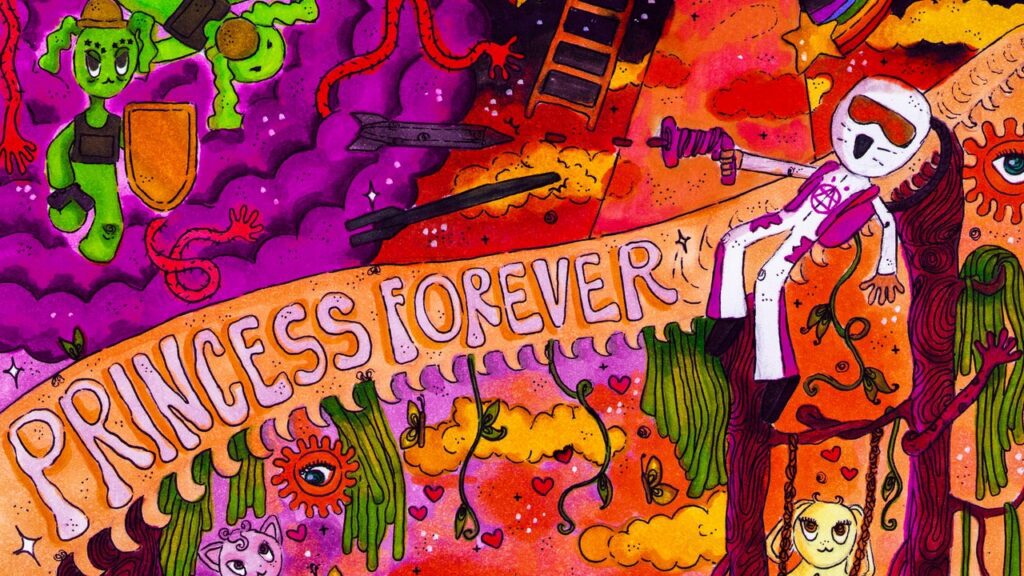
Dreamer Isioma is always a lover, even in times of pure chaos. In their past work, the Chicago native has depicted the contours of queer love via a gorgeous blend of dream pop, hushed rap, and smooth R&B. Their most recent record, Princess Forever, expands upon their impressive range, melding high-stakes storytelling and Afrofuturist aesthetics to convey the joy and turbulence of finding love among decay.
While many of the songs on Princess Forever build on the soft R&B of their previous records, the strongest tracks here are more eclectic, incorporating elements of disco, Afrobeats, and indie rock. The standout “Gimmie a Chance” coalesces harp, airy synths, and a funky bassline into an effortlessly smooth and danceable love song. Elsewhere, on “Touch Your Soul,” the artist captures a spiritual connection so deep that physical touch becomes unnecessary. It doesn’t matter who else touches their lover’s body, Dreamer proclaims, “because I can touch your soul.”
Princess Forever showcases the artist’s most cohesive storytelling to date. The lyrics make near-constant references to surviving an apocalypse, as Dreamer chronicles a burning world, or people migrating to live on other planets. Finding intimacy amid this chaos, Isioma argues, is to experience high highs and low lows; there is nothing in between. Dreamer writes about the album’s recurring themes—life among decay, love amid the rot—with fervor; the passion here sets their storytelling apart from previous releases. “Z’s Lullaby” describes the intensity of love at first sight, while on reverb-heavy slow jam “Technicolor Love,” possession and adoration become one: “She fuckin’ hates me but she’s mine,” Isioma sings. This kind of love is not easy, nor is it even particularly healthy. It is ardent, chaotic, and all-consuming, yet they also crave the stability of a life partner. When everything around you feels as though it’s going up in smoke, that kind of devotion can feel like salvation.
Princess Forever seems to argue that the antidote to the slow poison of the apocalypse lies in Afrofuturism. One of Afrofuturism’s liberatory promises is that the end of the world as we know it could lead to a better one for Black people across the diaspora. The intergalactic soundscape Isioma builds here gestures toward the freedom that might exist beyond earthly realms. Rather than framing the journey to find that autonomy as merely an escape route, Isioma suggests it could lead to an emancipatory future. “Saying fuck the world brings me inner peace/It’s all gonna blow up anyway/We’re all gonna float to outer space,” they proclaim on “Fuck Tha World.” When this world ends, a brighter one may emerge.
Though Princess Forever shows immense growth, Dreamer’s storytelling feels more memorable than some of the beats here. The production on “Fuck Tha World” and “Technicolor Love” are nearly indistinguishable from each other, an anomaly on a record that is otherwise unafraid of experimentation. And while much of Dreamer’s Afrofuturist lyricism is innovative and intentional, at times, the celestial motifs can feel monotonous and repetitive.
Much of Afrofuturist art deals with life-or-death circumstances: People are fighting for survival, for inalienable rights, for the abolition of racism and colonialism. But Princess Forever shines brightest in its celebration of the little moments—in its insistence that a fight for a new world order is also a fight for more pleasure, more romance, and more peace. “They say the world’s on fire/I call that a life on Mars/When our worlds collide/All I see are stars going light speed,” the artist sings on “Starz.” In these flashes, Isioma reminds us that from the ashes of a doomed world, the spark of new love can rise.
